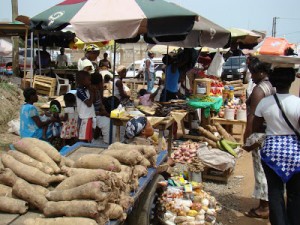Look inward for solutions to our economic problems
 Ghana today finds itself in the harshest economic meltdown in many years. This is not because the government of the day is not doing its best, but for the simple reason that as a people we are yet to wake up from the slumber of neo-colonialism that has kept us down for decades.
Ghana today finds itself in the harshest economic meltdown in many years. This is not because the government of the day is not doing its best, but for the simple reason that as a people we are yet to wake up from the slumber of neo-colonialism that has kept us down for decades.
Nkrumah foresaw this and warned about the return of the colonial masters or neocolonialism. This means that the colonialists have diverted from controlling our destiny politically to using economics as the bait now. What this means is that so long as we continue to get ourselves tied to the Breton Woods institutions, there is no way we can overcome the prevailing economic situation.
This is because the Structural Adjustment Programme they prescribe for us has never yielded any result as echoed by Kofi Asamoah, the Executive Secretary of the Trades Union Congress (TUC) during Wednesday’s demonstration staged by organised labour. Former President Rawlings followed SAP religiously to no avail. Former President Kufuor even went to the extent of declaring Ghana as Highly Indebted and Poor Country (HIPC) according to their standards, but that also did not help.
It is clear that the economic path we have taken for ourselves as a nation would bring nothing but untold hardship to both present and future generations. The fact remains that no nation that has developed did so under foreign supervision or influence. It has been proven that prosperity can only be generated when we begin to look inward and harness our God-given resources. The late Dan Lartey preached ‘Domestication’ till he departed but all we did was to make fun of him.
We can salvage this country’s economic plight when we turn to the bountiful opportunities agriculture presents us. It is sad that a nation that is blessed with enormous arable land cannot use it in any way to engineer prosperity. Agriculture alone can liberate us from the economic mess we find ourselves in. The United States of America, for instances, developed on the back of huge plantations of cotton, wheat, corn and other agricultural produce over the centuries. These plantations do not only provide food for the masses, but also provide ready jobs for the youth and revenue for the country.
The late Libyan leader Col. Muamar Gaddafi during his visit to Ghana for the 2007 extraordinary summit of the African Union, was alleged to have asked whether Ghanaians grow grass. This was because he travelled from Accra to the north on his way out of the country because there was a flight embargo imposed on him, and saw only vast arable land lying fallow and growing grass. Whether this is hear-say or not, it is obvious we are just wasting the rich lands that surround us.
There are countries like Libya that are mainly desert land and hold very little prospect for agriculture. Therefore, it is only prudent that we concentrate on developing the agricultural sector to take care of our needs. Ironically, however, it is that sector which has been ignored by most governments. Merely giving national awards to farmers cannot promote the sector, so governments must go beyond that to creating the enabling environment for people to go into large scale commercial farming that would be competitive in the West African market and beyond.
As Ghanaians demonstrate, it is important to note that as a people we have responsibilities towards making the nation economically viable. Waiting for government alone to salvage our economic plight would be impossible. Individuals should begin to see ways in which they could create prosperity that would affect others. This would mean that the private sector must be supported to develop to the extent that it would take over job creation and generate the needed revenue for prosperity.
Fortunately, Ghana still has the likes of Apostle Sarfo Kantanka who are prepared to spearhead the country’s industrial revolution, provided that he does not become frustrated by numerous challenges presented by institutional bureaucracy. Elsewhere in the world, heavy car manufacturing industries such as Mercedes, Ford and Toyota are all operated by private entities, so why can’t it work in Ghana?
Prescriptions provided by the IMF and World Bank have not been able to solve our nation’s economic problems because their measures are merely intended to offer temporary relief rather that permanent solutions. The result is that things are going to be tough and government is going to continue pressing us for more taxes because collectively we are not prepared to hold the bull by the horn and do the right thing.
The principal streets of Accra were awashed with red during Wednesday’s demo staged by organized labour to compel government to reduce exorbitant tariffs and energy levies. Government may comply by announcing some form of reduction and the situation may become bearable in the short term, but the truth is that such scenarios would always surface so long as we continue to ignore what could take us out of our economic doldrums.
It is time to look inward and see what we can do as a nation to undo the shackles of economic bondage we find ourselves in. It is time to wean ourselves from these neo-colonial economic institutions, structures that have never done us any good.
By Alexander Nyarko Yeboah
Source: GNA
